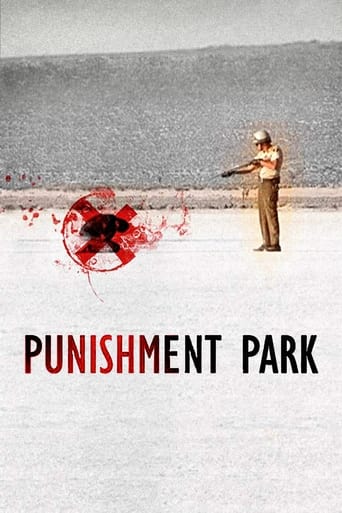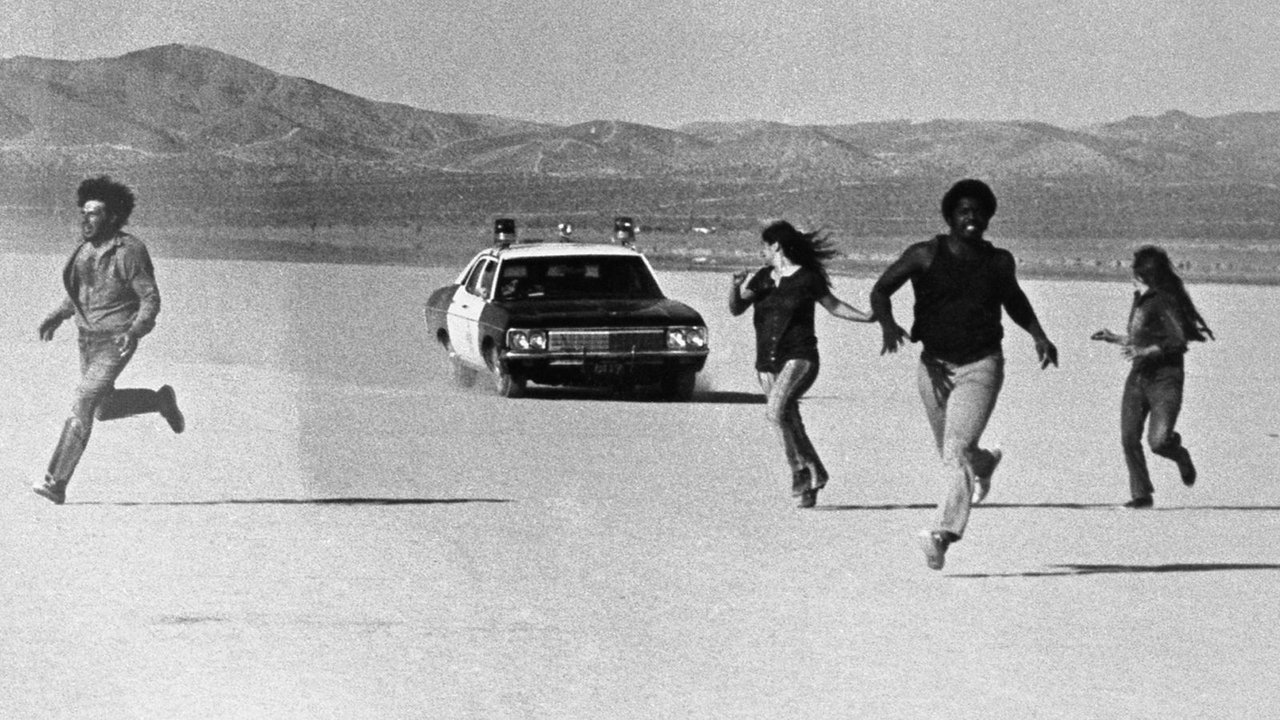esotericbonanza
A brilliant and angry piece of filmmaking, so assured in its style as a mock-documentary that the seams of fiction barely show. With the clarity of a working crystal ball, this film saw the world around it as it was when it was made and saw somehow where things were heading and the result is one of the most despairing pieces of work imaginable. Misanthropic, and with good reason, Watkins' film has no hope for the media or the youth and no faith the governing forces that direct them. I urge you to seek this out.
Steve Pulaski
Peter Watkins' Punishment Park is a compellingly brutal film, serving as commentary on the polarization of America and the treatment of those with unpopular viewpoints in the Vietnam-era. Shot in 1971 on a miniscule budget, the film offers its ideology on American youth at the time, the dehumanization and corruption of government, and the torment of people, with the looming thought that they may have not even been doing anything wrong.The film was one of the very first to be shot in the style and tone of "cinéma vérité," a technique used by filmmakers to generate a documentary-like vibe and to persuade the audiences into believing what they're seeing is real footage. It is 1970, and the Vietnam War is escalating, with president Richard Nixon losing control and running out of options. He declares America as a "state of emergency, and proposes the "McCarran Internal Security Act of 1950," which gave federal authorities the right to detain those who appeared as a "risk to internal security." We follow members, mostly young university students, of various political movements, such as the feminist movement, the anti-war movement, the civil rights movement, and the communist movement who are arrested and given the choice of either serving their full time sentences or spending three days at the ambiguously named "Punishment Park." Many of them choose the second option, where they are told that if they can run fifty-three miles in brutal California desert heat and make it to an American flag checkpoint, with a two hour head-start before National Guardsmen and federal authorities are dispatched to try and stop them, that they will be released and their pending dues will disappear.As we see many young students run helplessly through the desert, with temperatures well over one-hundred degrees, we focus on another group of students who are pleading their cases to a group of men and women in a tent on why they were resisting and evading the Vietnam war. The people are simply not interested in hearing their views and constantly interrupt them, leading to contentious interactions involving heavy cursing and strong morality and ethics that increasingly come into play as time goes on.The cinematography is as raw as they come, with extensive shots of desert locations inhabited by sweaty, breathless students desperately clinging to their last hope for survival and humanity-driven choices. Watkins directs this picture with numbing realism that stems not only from the provocative cinematography, but from the screenplay, composed of extemporaneous dialog and improvisation on the actors' part. Their performances are coldly real and chillingly authentic.Punishment Park sort of tires out in its third act, being that it greatly established its point and purpose within the first two, but the film relentlessly tries to depict a brutal reality filled with dissent, isolation, and strict government control that thankfully never was prophetic. What is amazing is despite ones assumption that the film's ideology and issues are dated and no longer relevant, in a post-9/11, Patriot Act, NDAA world, it would appear we must look onto films like these as poetry for the present.Directed by: Peter Watkins.
ellkew
This is a prophetic film about the US government quashing any kind of dissent against what it considers its moral codes of the day. Putting those accused in front of a farcical panel that represents the establishment or is supposed to speak for the masses and condemns them to be incarcerated or face possible freedom by going through the terrain of Punishment Park and if succeeding to eventual freedom. The fact that the band of 'kids' have to traverse over 50 miles in impossible desert heat with no water with armed police in pursuit is an indication of their certain fate.This is a film that boils the blood. It made me angry. It made me feel sick. It made me think. I could not believe it was made such a long time ago. It seems to reflect exactly what is going on right now in Cuba with those prisoners who still have not been charged. What the hell is going on and how can they do that? Totally contravene international law on human rights. This film covers so many themes and issues about society and how we treat anyone questioning the status quo. The film shows a tipping in the balance of power. The point where the state runs amok and is allowed to carry out its ultimate goal of simply removing dissenter from the equation. Surely diversity is the essence of humanity? What is particularly sad is that Peter Watkins himself is not given carte blanche by some British television channel to make what he wishes as this is clearly a man who has something to say. In this age of dumbed down television with anodine members of the public exposing their flesh, constantly effete presenters and vacuous woman designers, don't we deserve to aim somewhat higher in what we produce and send out to the masses. Don't we want to dream anymore?
moth >i<
This comment is based on watching Punishment Park last night, in 2008 on Sundance Channel. I had never heard of the film and couldn't figure out when it was filmed. The characters rang true to the 60s instead of displaying distortions in language, mannerisms and attitudes that films being made now about the 60s contain.1971, when the film was released, was still very much the political climate of the 1960s. In some ways it was the pivotal year of radical politics. Radical politics dwindled, took different directions and tone after that year.The setup of the "war game" seemed impossible for the rebels. They started out on foot, unarmed, crossing a desert. Simply by remaining upright they were visible from a distance. When they agreed to the sentence it is not clear that they even knew that the soldiers-in-training they had to evade were armed and in vehicles, what the terrain looked like, the heat, no water, or that they wouldn't be rescued from death. They didn't know how unlikely it was that they would make it to the flag.The rebels split into packs of two to eight people. I kept debating whether it would be better to head out alone but no one took that option. It might not have made much difference but at least you wouldn't be assisting someone who couldn't make it or be the one people thought they had to assist.In an action film the rebels would have succeeded, there would have been heroism, the unbeatable odds would have been beaten and people would have shown superhuman endurance. Tom Cruise would have captured the flag.Actually the physical endurance of the rebels was one of the less plausible aspects. 1960s Radicals were not prone to daily strength and endurance regimen. They had the advantage of being young but still
Since I run in the desert I experience how quickly you are wiped out by heat. Untrained, without shade or water, three days? Maybe not.The long discussion of the moral inferiority of their enemy that some the rebels engaged in was very true to the times, and ineffective in getting to the flag thereby ending their sentence.Why didn't the soldiers follow footprints and track the large band that way? They probably figured logically, with 50 miles to cover the rebels probably took a straight path, which they did, even to finding a small provisions box.It's not fair to expect people to strategize a completely unfamiliar situation but
The rebels could have taken the two-hour head start, curved to the left, jogged through the night instead of dealing with the heat, tried to find shade to hide out/rest during the day, and come up behind the flag at night. But, that wasn't the point of the movie.I yelled at the TV, "That's why I run in the morning, in case I am ever in a situation like that", and am relieved that I am now relatively old and moderate to be in a life and death political situation. There was a political paranoia to the times that the film captures and I might have internalized.The press/film crew was the only accountability for the soldiers. The photographers engaged in argument, challenged and were indignant at times. By 2008, after Abu Ghraib, the soldiers would have been more aware of how long that coverage could haunt them.Sometimes the film looked like a documentary, sometimes acted, sometimes plausible, sometimes not. Not having seen any pre-movie explanations I kept wondering what this film was, enough to go to IMDb to find out, and felt good about having guessed that it was a pseudo-documentary.The sun is coming up. I better go run NOW before it gets hot.


 AD
AD




